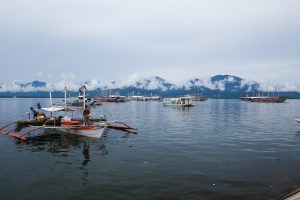The Philippine government has reportedly backed down on a plan to deploy fishermen as militia forces in disputed parts of the South China Sea, citing concerns about the potential for conflict with China.
In a briefing on November 5, President Rodrigo Duterte’s National Security Adviser Hermogenes Esperon said that the plan, designed to beef up its defenses after years of Chinese intimidation in disputed areas, had not been “finalized” due to worries that the action could be “misconstrued.”
Last month, Philippine defense officials said they were considering recruiting fishermen into seaborne militia units similar to those used by Beijing to assert its claims over the resource-rich seaway. The plans prompted one prominent Filipino observer to predict a “‘gray zone’ arms race in Southeast Asia.”
On October 12, Navy chief Vice Admiral Giovanni Bacordo told a senate finance committee hearing about the navy’s plans to assemble “maritime CAFGUs,” or Citizen Armed Forces Geographical Units, in order to protect the nation’s interests in adjacent waters including within its 200-nautical-mile Exclusive Economic Zone.
Bacordo later said that such fishing militias would serve as “force multipliers” in the West Philippine Sea, as Manila terms its portion of the South China Sea, during periods when the Philippine Navy or Philippine Coast Guard were on patrol or otherwise unavailable. The fishing militias would be recruited by the Philippine Army but trained by the Philippine Navy. “It’s a stop gap measure to fill where we are not, where the Navy and where the Coast Guard are not,” Bacordo said.
The Philippines has struggled to repel the “gray zone” tactics that Beijing has employed to back its expansive claims in the South China Sea since 2012, when it seized control of Scarborough Shoal. Since then, it has deployed flotillas of fishing boats and coast guard ships to harass Filipino fishermen, and to block supplies from reaching Thitu Island, an isolated, Philippine-held feature in the Spratly Islands. Vietnam, which likewise has disputes with China in the South China Sea, created its own maritime militia forces back in 2009.
But the Filipino plan came under immediate criticism from many quarters. Former Senator Antonio Fuentes Trillanes IV, a retired navy officer, told the South China Morning Post that a maritime militia “would only create more problems than it intended to solve,” leading to an increased “probability of miscalculations, which could trigger a shooting war.”
In announcing the suspension of the plan on November 5, however, Esperon cited a similar desire to avoid “actions that would be misconstrued as miscalculations.” He expressed “a preference for forces that are better equipped rather than ragtag forces,” and added, “we are not at war with China.”
The Philippines announcement came on the same day as China said it would allow its coast guard to use weapons against foreign ships involved in illegal activities in waters it claims, if they fail to obey Chinese orders.
The decision reflects the fraught China policy of the Duterte administration, which has sought to stave off Chinese incursions in disputed parts of the South China Sea, while also leaning on Beijing for diplomatic support and financing for infrastructure development.
The decision comes after the government lifted a ban on offshore oil and gas exploration in disputed parts of the South China Sea. While one official said that the Philippines could begin drilling for oil and gas in Reed Bank without China’s participation, others have raised the possibility of joint resource development with Beijing. In 2018, the two nations signed a memorandum of understanding about joint resource exploration, four years after the ban was imposed due to maritime tensions.

































